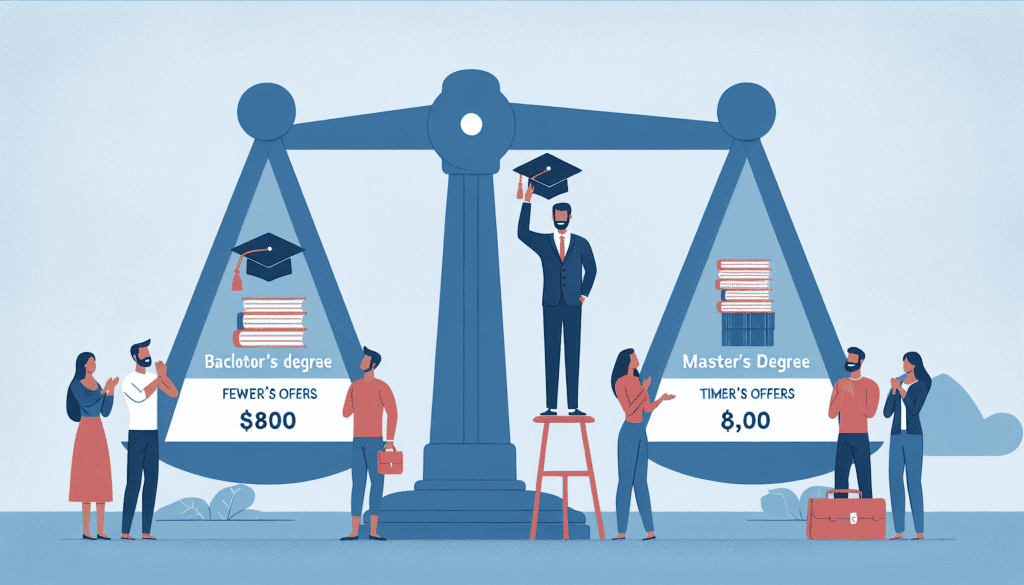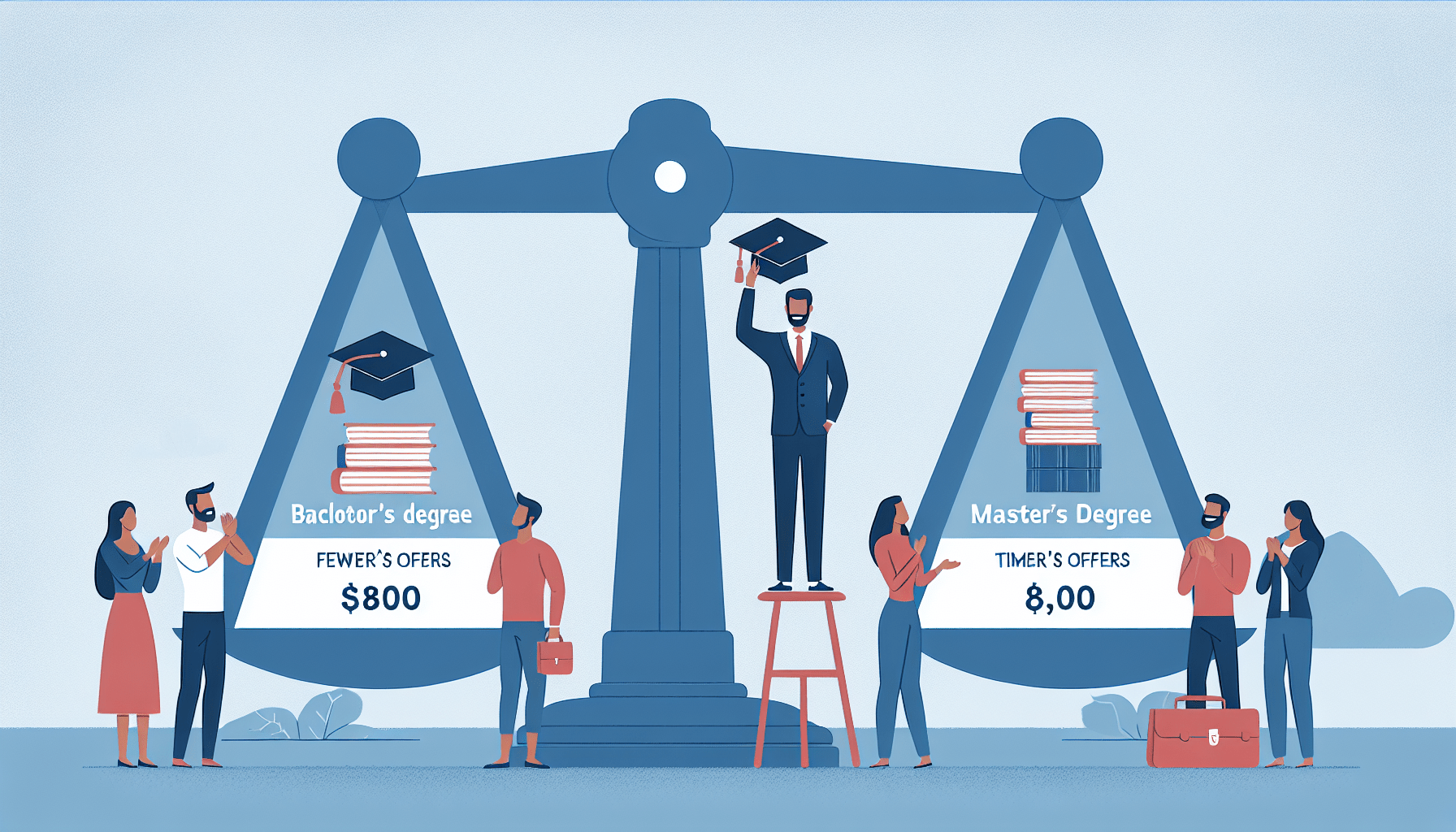In today’s competitive job market, individuals are constantly seeking ways to enhance their qualifications and stand out from the crowd. One common avenue to achieve this is through further education, specifically obtaining a master’s degree. The question arises, however, as to whether a master’s degree is truly superior to a bachelor’s degree. This article examines the advantages and disadvantages of pursuing a master’s degree, shedding light on the potential benefits and considerations for individuals contemplating this decision.

Job Opportunities
Specialized Positions
Having a master’s degree can open up a world of specialized positions that may not be available to those with just a bachelor’s degree. Employers often look for candidates who have advanced knowledge in a specific area. With a master’s degree, you can demonstrate that you have gone beyond the general knowledge gained in a bachelor’s program and have acquired specialized skills and expertise. This can make you a highly desirable candidate for jobs that require a deep understanding of a specific field.
Higher Level Positions
A master’s degree can also lead to higher level positions within organizations. Many managerial and leadership roles require candidates to have a master’s degree. This is because a master’s degree signifies a higher level of education and knowledge, which is often necessary to effectively lead and manage teams. By pursuing a master’s degree, you can position yourself for promotions and career advancement opportunities that may not be available to those with only a bachelor’s degree.
Greater Career Advancement
One of the key benefits of earning a master’s degree is the potential for greater career advancement. With the specialized knowledge and skills gained through advanced coursework, you can stand out among your peers and compete for promotions and higher salary positions. A master’s degree can also provide you with the necessary qualifications to apply for more competitive jobs and positions, giving you a distinct advantage over candidates with only a bachelor’s degree. Investing in a master’s degree can greatly enhance your long-term career prospects and open doors to exciting opportunities.
Earning Potential
Increased Salary
One of the most compelling reasons to pursue a master’s degree is the potential for increased salary. On average, individuals with a master’s degree earn higher salaries compared to those with only a bachelor’s degree. This is because employers recognize and value the advanced knowledge and skills gained through a master’s program. By investing in your education and obtaining a master’s degree, you can position yourself for higher paying jobs and better financial stability.
Potential for Leadership Roles
With a master’s degree, you not only have the potential to earn a higher salary, but also to secure leadership roles within organizations. Many companies and industries require candidates to have advanced degrees when filling managerial and executive positions. By earning a master’s degree, you demonstrate your commitment to personal and professional growth, as well as your ability to handle the complexities and responsibilities that come with leadership roles. This increased potential for leadership positions can lead to even greater earning potential and career satisfaction.
Wider Range of Job Options
Earning a master’s degree can significantly expand your job options. With advanced coursework and specialized knowledge, you can pursue careers in fields that may not be accessible to individuals with only a bachelor’s degree. Your expertise and qualifications can make you a strong candidate for a variety of roles within your chosen field, allowing for a wider range of job options. Whether you’re seeking a career change or aiming to advance within your current industry, a master’s degree can provide you with the necessary skills to excel in a diverse array of positions.
In-Depth Knowledge
Advanced Coursework
One of the primary benefits of pursuing a master’s degree is the opportunity to engage in advanced coursework. Unlike a bachelor’s program, which provides a broad overview of a particular subject area, a master’s program delves deeper into specific topics. Through advanced coursework, you gain a more comprehensive understanding of your chosen field, allowing you to develop a specialized expertise. This in-depth knowledge can set you apart from bachelor’s degree holders and make you a highly qualified professional in your field.
Research Opportunities
A master’s degree often involves research components, providing you with the opportunity to conduct independent studies and contribute to your field. Engaging in research allows you to develop critical thinking and problem-solving skills while expanding your knowledge base. The research opportunities available at the master’s level can also serve as a stepping stone towards pursuing a Ph.D. or working in research-intensive industries. By conducting research, you not only enhance your own knowledge but also contribute to the advancement of your field.
Specialization in Chosen Field
By pursuing a master’s degree, you can specialize in a particular area within your chosen field. This specialization sets you apart from individuals with only a bachelor’s degree and positions you as an expert in your field. Specializing in a specific area can lead to unique job opportunities and career growth. Employers often value candidates who have specialized knowledge and skills, as they can bring a unique perspective and contribute to the overall success of an organization.
Competitive Advantage
Preferred Qualification
In many industries, having a master’s degree is increasingly becoming a preferred qualification for job seekers. Employers often receive an overwhelming number of applications, and having a master’s degree can make your application stand out from the competition. The advanced level of education and specialized knowledge gained through a master’s degree program can demonstrate your dedication to your field and your ability to excel in demanding roles. By possessing this preferred qualification, you increase your chances of being selected for interviews and ultimately securing job offers.
Stand Out from Bachelor’s Graduates
Competition in the job market is fierce, particularly among bachelor’s degree graduates. A master’s degree can give you a competitive edge and differentiate you from other candidates. With a master’s degree, you possess a higher level of education and expertise, making you a more desirable candidate for employers seeking candidates who can bring innovative ideas and advanced skills to the table. By standing out from bachelor’s degree graduates, you increase your chances of being noticed by employers and being considered for higher-level positions.
Higher Employability
In today’s rapidly evolving job market, having a master’s degree can significantly enhance your employability. Employers often value advanced degrees as evidence of a candidate’s ability to think critically, solve complex problems, and adapt to changing industry trends. By earning a master’s degree, you increase your marketability and make it easier for employers to recognize your potential contributions. This higher level of employability can provide you with more job opportunities and greater flexibility when navigating your career path.

Networking Opportunities
Access to Industry Professionals
Pursuing a master’s degree gives you access to a vast network of industry professionals. Professors and faculty members often have extensive connections within their respective fields, which they can share with their students. These connections can provide you with valuable opportunities to learn from and collaborate with professionals who have established themselves in your industry. Networking with industry professionals can lead to job opportunities, mentorship, and a deeper understanding of the trends and advancements in your chosen field.
Connections with Fellow Graduate Students
In addition to networking with industry professionals, pursuing a master’s degree allows you to build connections with fellow graduate students. These connections can be highly valuable throughout your career, as they provide opportunities for collaboration, knowledge-sharing, and support. Building strong relationships with your peers can lead to lifelong professional connections and potential collaborations on research projects or career ventures. The diverse backgrounds and experiences of your fellow graduate students can also expose you to different perspectives and broaden your understanding of your field.
Alumni Networks
Upon completing your master’s degree, you become part of an alumni network specific to your institution. Alumni networks often provide extensive resources and support for graduates, including job postings, networking events, and mentoring programs. By being a part of an alumni network, you gain access to a community of professionals who have successfully completed the same program and can offer guidance and support as you navigate your career. These connections can be instrumental in your personal and professional growth, opening doors to new opportunities and providing a sense of belonging within your field.
Personal Development
Enhanced Analytical and Critical Thinking Abilities
Pursuing a master’s degree requires you to develop and refine your analytical and critical thinking abilities. Advanced coursework often involves complex problem-solving, data analysis, and research methodologies. By engaging in these activities, you sharpen your analytical skills and train your brain to think critically about various issues within your field. These enhanced abilities can have a significant impact on your professional performance, enabling you to make informed decisions, solve complex problems, and contribute valuable insights to your organization.
Advanced Communication and Presentation Skills
Effective communication and presentation skills are vital in almost every professional setting. Pursuing a master’s degree provides numerous opportunities to develop and refine these skills. Through coursework, research projects, and presentations, you learn how to effectively convey complex ideas, present arguments, and engage in academic and professional discussions. Master’s degree programs often require written assignments and presentations, giving you ample practice to improve your communication and presentation abilities. These skills are not only valuable in academia but also transferable to various career paths.
Greater Independence and Research Skills
The pursuit of a master’s degree fosters independence and self-directed learning. Master’s programs typically require you to take responsibility for your own learning, including conducting research, managing your time, and organizing your study materials. By taking ownership of your education, you develop valuable research skills and the ability to work independently. These skills are highly transferable and can be applied in a wide range of professional settings. The confidence and autonomy gained through a master’s degree allow you to take on challenging projects and adapt to new situations with ease.
Specialized Fields
Certain Jobs Require a Master’s Degree
In some industries and professions, a master’s degree is a requirement for certain jobs. Whether it is in healthcare, education, or engineering, certain roles may only be accessible to individuals who hold advanced degrees. By obtaining a master’s degree, you can meet the necessary qualifications and gain entry into these specialized fields. These fields often offer unique career opportunities and higher levels of expertise, making a master’s degree essential for those who wish to excel in these areas.
Expertise in Specific Industries
A master’s degree can provide you with expertise in specific industries. By focusing your studies on a particular field, you gain a deep understanding of its intricacies, emerging trends, and best practices. This specialized knowledge can give you a competitive advantage when pursuing careers in industries such as finance, technology, healthcare, or environmental science. Employers in these industries often seek candidates who possess advanced knowledge and skills, allowing you to have a direct impact on these industries’ growth and development.
Access to Specialized Resources
Pursuing a master’s degree often grants you access to specialized resources that can enhance your learning and research. Universities and institutions frequently provide their master’s students with state-of-the-art laboratories, cutting-edge technologies, and exclusive databases and libraries. These resources can give you an edge when conducting research, gaining hands-on experience, or accessing specialized information within your field. By having access to these resources, you can further deepen your knowledge and conduct research that contributes to the advancement of your chosen field.
Intellectual Fulfillment
Opportunity for Intellectual Growth
For many individuals, the pursuit of a master’s degree is driven by a desire for intellectual growth. Master’s programs encourage critical thinking, engage students in rigorous academic discussions, and provide opportunities to challenge existing theories and contribute to developing new knowledge. By immersing yourself in a master’s program, you have the chance to expand your intellectual horizons, engage with cutting-edge research, and explore your field at a deeper level. This opportunity for intellectual growth can be profoundly fulfilling and can enrich your personal and professional life.
Engagement in Advanced Research
A master’s degree often involves engaging in advanced research projects that contribute to the body of knowledge in your field. This engagement in research allows you to explore areas of interest, investigate unanswered questions, and contribute to the advancement of your field. Through research, you have the opportunity to explore your intellectual curiosity, hone your research skills, and make meaningful contributions to your chosen discipline. The engagement in advanced research can be intellectually stimulating and fulfilling, providing a sense of purpose and accomplishment.
Ability to Contribute to the Field
Earning a master’s degree positions you as a knowledgeable and skilled professional within your field. With your advanced understanding and expertise, you have the ability to contribute to the field through publications, presentations, and collaborations. By sharing your research findings, insights, and perspectives, you contribute to the ongoing discourse and progress in your field. This opportunity to contribute to the field not only allows you to leave a lasting impact but also provides a sense of fulfillment and pride in your achievements.
Personal Interest and Passion
Opportunity for In-depth Study
For individuals who have a deep interest in a particular subject or field, pursuing a master’s degree provides an opportunity for in-depth study. While a bachelor’s degree offers a general understanding of a given area, a master’s program allows you to delve deeper into the subjects that ignite your curiosity and passion. By immersing yourself in advanced coursework and research, you can explore your interests at a much higher level, gaining a comprehensive understanding of your chosen field. This opportunity for in-depth study can be incredibly fulfilling for individuals driven by a genuine love for learning.
Pursuit of Knowledge
The pursuit of knowledge is a driving force for many individuals seeking to earn a master’s degree. By immersing yourself in advanced coursework, engaging in research, and connecting with industry professionals, you have the opportunity to expand your knowledge and broaden your perspectives. This pursuit of knowledge goes beyond the attainment of a degree; it is a lifelong commitment to ongoing learning and personal growth. In satisfying your thirst for knowledge, you cultivate a sense of curiosity and intellectual fulfillment that extends well beyond your formal education.
Greater Satisfaction in Learning
Earning a master’s degree can bring about a greater sense of satisfaction in the learning process. As you engage in advanced coursework, conduct research, and apply your knowledge to real-world situations, you experience a deeper level of intellectual engagement. The challenges and rewards of pursuing a master’s degree can instill a sense of satisfaction and fulfillment in both the process and the outcome. By investing in your education and pursuing your passions, you can derive immense satisfaction from your learning journey, leading to lifelong personal and professional growth.
Time and Financial Investment
Extended Duration of Study
It is important to consider the extended duration of study when contemplating pursuing a master’s degree. Master’s programs typically require one to two years of full-time study, which can be a significant time commitment. This longer duration can impact various aspects of your life, including your career, personal life, and financial stability. Understanding and balancing the time demands of a master’s program is essential for determining whether it is the right choice for you. It is important to assess your personal circumstances and determine if you are willing and able to commit to the extended duration of study.
Tuition and Cost Considerations
Another factor to consider when contemplating a master’s degree is the associated tuition and costs. Master’s programs often come with a higher price tag compared to bachelor’s programs, and the cost can vary depending on the institution and program. It is crucial to carefully assess the financial implications of pursuing a master’s degree, including tuition fees, living expenses, and potential loss of income if you choose to study full-time. Exploring scholarship opportunities, financial aid, or employer sponsorships can help alleviate the financial burden of earning a master’s degree.
Balancing Work and Education
Many individuals pursuing a master’s degree choose to continue working while studying. Balancing work and education can be challenging, requiring effective time management and a strong commitment to both responsibilities. It is crucial to carefully consider the demands of your job and the feasibility of balancing it with the demands of a master’s program. Part-time or online options may provide flexibility for individuals who wish to continue working while earning their degree. Balancing work and education requires careful planning and a commitment to personal and professional growth.

